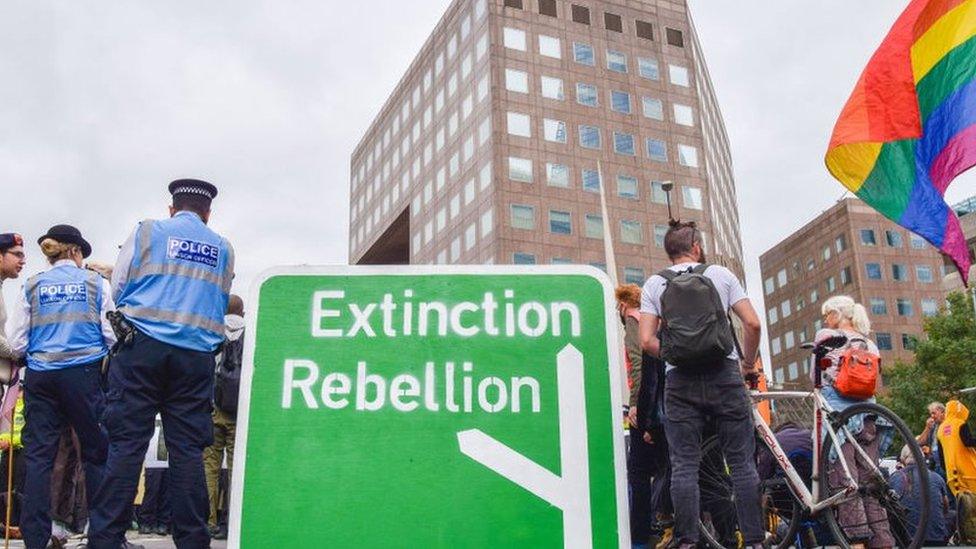The year in protests: From Chile to Lebanon, what happened next?
- Published
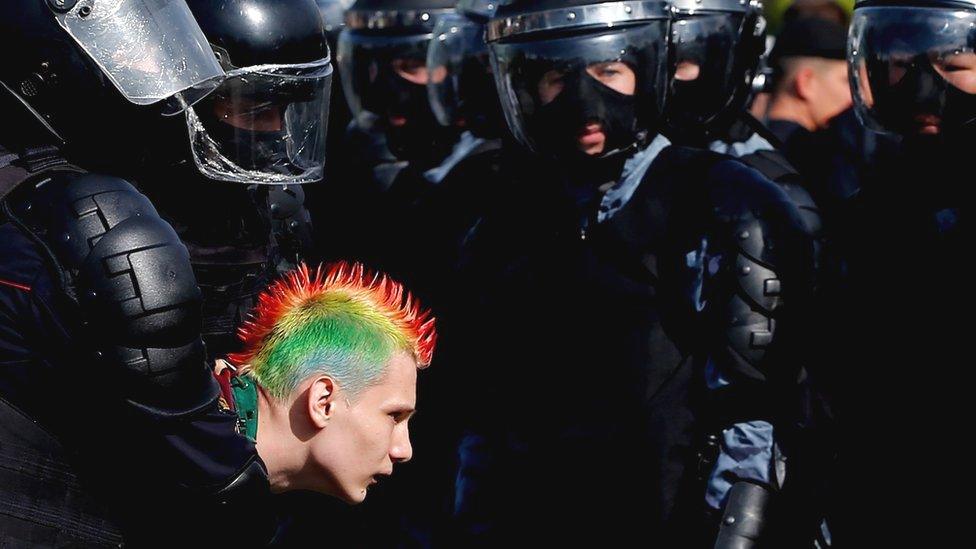
A protester is detained by police in Moscow in August. This summer, Russia saw demonstrations demanding free elections
It's no exaggeration to say protests swept every continent in 2019, because even Antarctica saw a demonstration this year.
Long-term presidents left office after protests in Sudan, Algeria and Bolivia. Violent unrest in Iran, India and Hong Kong continued well into December and threaten to spill over into 2020.
Here we return to three movements that gained momentum in 2019. Some of those who joined demonstrations early on tell us why they did so - and what changed.
Lebanon
What happened?
Lebanon has been dealing with its worst economic crisis in decades, and almost a third of people live under the poverty line
In October, the value of the Lebanese pound fell and new taxes on tobacco, petrol and voice calls on apps like WhatsApp prompted protests
Prime Minister Saad Hariri resigned, but the protests continued, with violent clashes taking place well into December
Why I protested
by Nour Myra Jeha, student, 17
I and my friends wanted a movement to happen even before these protests. We have real social and economic problems here, and we have wanted for some time for the people to notice it and act.
Lebanon is a country with rival religions and sectarianism, so it's really hard to start something yourself. We had such small numbers. But the small push came when the government put a fee on our WhatsApp calls. In Lebanon, WhatsApp is used by many people who can't afford to make calls normally.
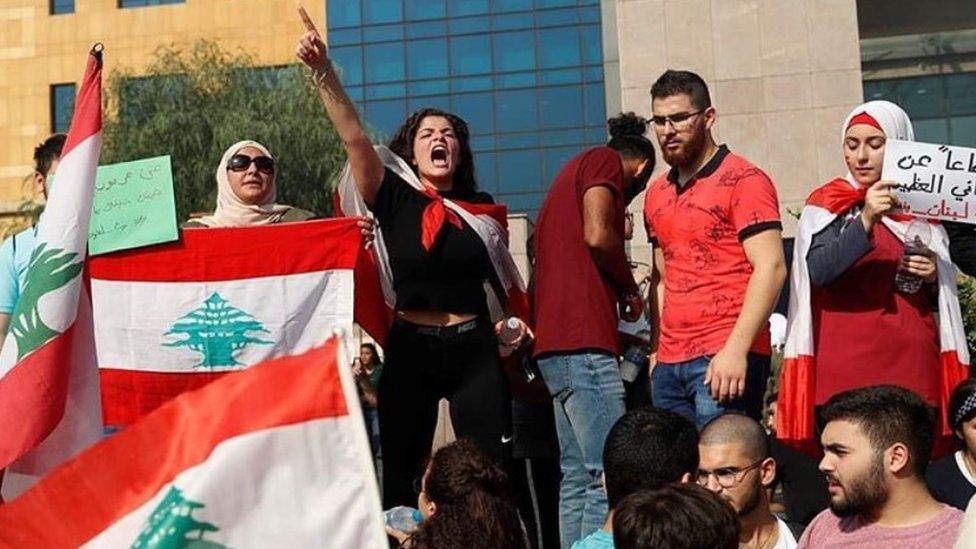
Nour (C) protesting in front of Lebanon's ministry of education
One day, the minister of education was in the area of the protests, and people started protesting around his car, and his security men got out of the car and started shooting [no-one was killed]. That was when citizens said they had had enough. People started noticing what the politicians really thought of us.
The next day, I and my friends went out. We started calling it a revolution. On that day, Lebanon left its religious problems aside. One of Lebanon's biggest problems is that our whole political system is determined by religion [Lebanon recognises 18 religious communities and the three main political offices are divided among the three biggest communities]. But that night, all Lebanon's people were united. That was a bit of a shock. We noticed the older generation there too. That's when we knew there was a change going on.
We want a government made of technocrats and not politicians, who have let us down again and again. And we want the voting age to be 18 and not 21. We don't expect things to change in a month, two months. But if we give up, all our hard work will go down the drain.
I am applying to study abroad. Before, I didn't know if I would want to come back, but now I am 100% sure I will. I want to see how a society with better rules can work, learn from that, and come back.
"I feel proud to be Lebanese," says protester in Beirut
Chile
What happened?
Protests were sparked by a rise in metro fares in October, a decision that was later reversed
They then grew to take in wider grievances over living costs and inequality, culminating in a million people marching in Santiago
At least 26 people have been killed and the UN has condemned the police and military response
Why I protested
by Daniela Benavides, English teacher, 38
In the first week, we had the military in the street so I wanted to see. You often see the police, but the military, with machine-guns, it's a completely different scenario.
The first day, I went because I wanted to take pictures. I could see many people there demonstrating, facing the military because of the history of this country [Chile was ruled by a military dictatorship between 1973 and 1990].
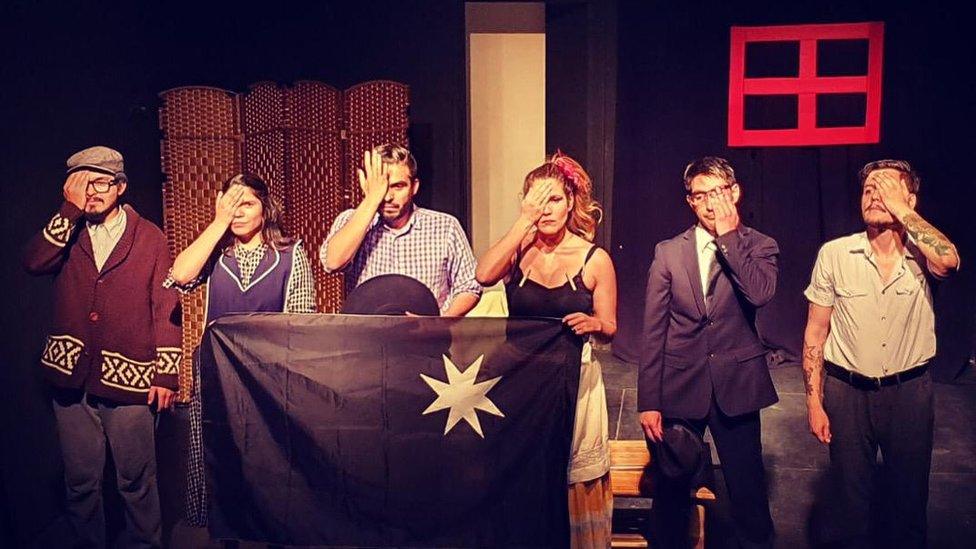
Daniela (third from right) and other actors in a play condemning violence against protesters, some of whom lost eyes because of rubber bullets
The next day, I went because I could feel I needed to be part of this, because I supported all the demands, because I have seen the inequality where I work. We need to change this system. Many people are suffering. Any person, any citizen of any country in this world must have education, health, proper living conditions, pensions.
Most of my students said this was a very sad moment for them, but they wanted to be fighting. They have lived their whole lives like this. They know what it is to not have money to go to the doctor. Or if they don't have a grant, there's no possibility for them to study.
The most memorable moment was the biggest demonstration that we had that Friday, 25 October. There were more than 1.2m people. You could see families, students, children, everyone was there because we needed to do something and show the world everything is not perfect. Chile despertó - Chile woke up. You could see that that day. People there just singing, hanging out together. It was really, really amazing.
Chile's "historic" protest march from above
When I saw so many people get injured by the police, I turned off the television. That's too much. It's not that I want to live in a bubble. But for mental health, you need to stop watching all these kinds of things.
I still go to the demonstrations but after an hour, two hours, I leave. We need to be careful. You never know if you are going to get shot by the police or hit by a Molotov cocktail.
- interview by BBC Monitoring's Tom Garmeson

Read the best of our protests coverage

Hong Kong
What happened?
Demonstrations began in June over a bill allowing extradition to mainland China
That bill was withdrawn but the protests continued, with protesters making five main demands
At times, hundreds of thousands of people have turned out on Hong Kong's streets. The protests continue.
Why I protested
by Helen*, 30
I was there during the Occupy movement [the short-lived Umbrella Revolution of 2014 calling for electoral reform]. But this felt different.
A lot of people got very disappointed by the Umbrella Revolution in 2014. This time, we felt it was a reawakening of five years ago. A lot of people I met have said that if [reform] doesn't happen, we will never make it, and we will have to accept it. This is it.
For a while, I thought it was going to die off. But the way people are being treated is so much more brutal than before - we had tear gas fired at us and we were nowhere near the front line. So many people are angry.
There have been so many points in the past six months where I've been fearing it will fizzle out and since the district elections [when pro-democracy groups made huge gains in November], things have calmed down. But I don't think it's going to stop so soon. You keep hearing news of people disappearing, people being arrested. And the youngsters are the ones still going at it, which is incredible.
It's been such a traumatic event that it's only now, after I've left Hong Kong, that I feel a little bit more sane. I do get bombarded by news, and I have a group on Telegram which I muted. But every hour, I'm checking the news.
I'm quite pessimistic about [the demands being met]. I don't think we will get universal suffrage. China will never allow it. But part of me hopes some demands will be met. It will never be a full victory. But small victories count.
*Real name not used for fear of repercussions
Hong Kong protests: "I can't say I love China any more"
- Published11 November 2019
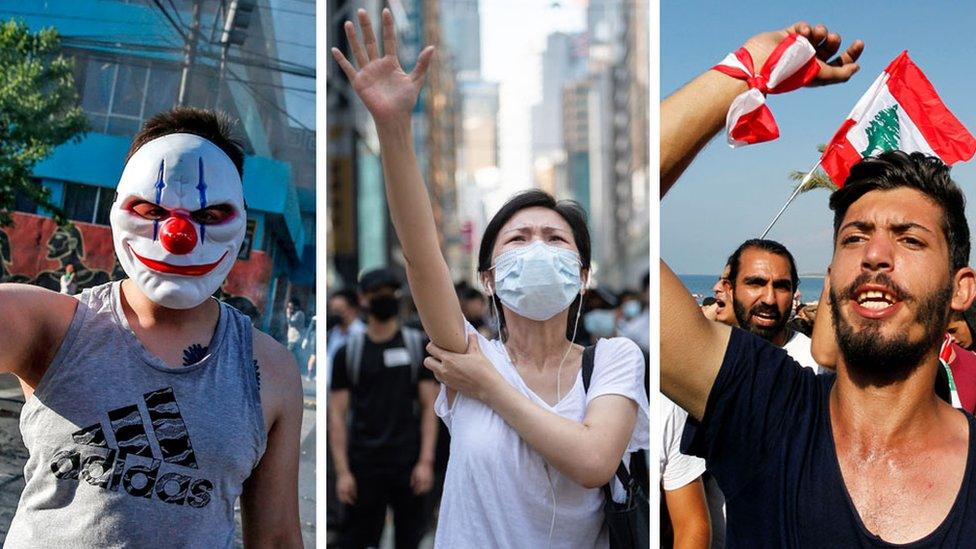
- Published7 November 2019
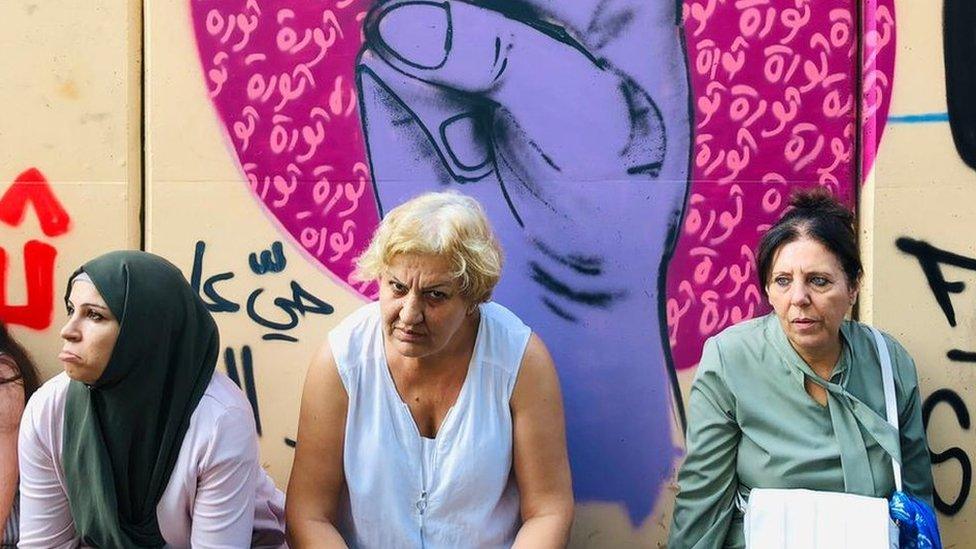
- Published14 April 2022
